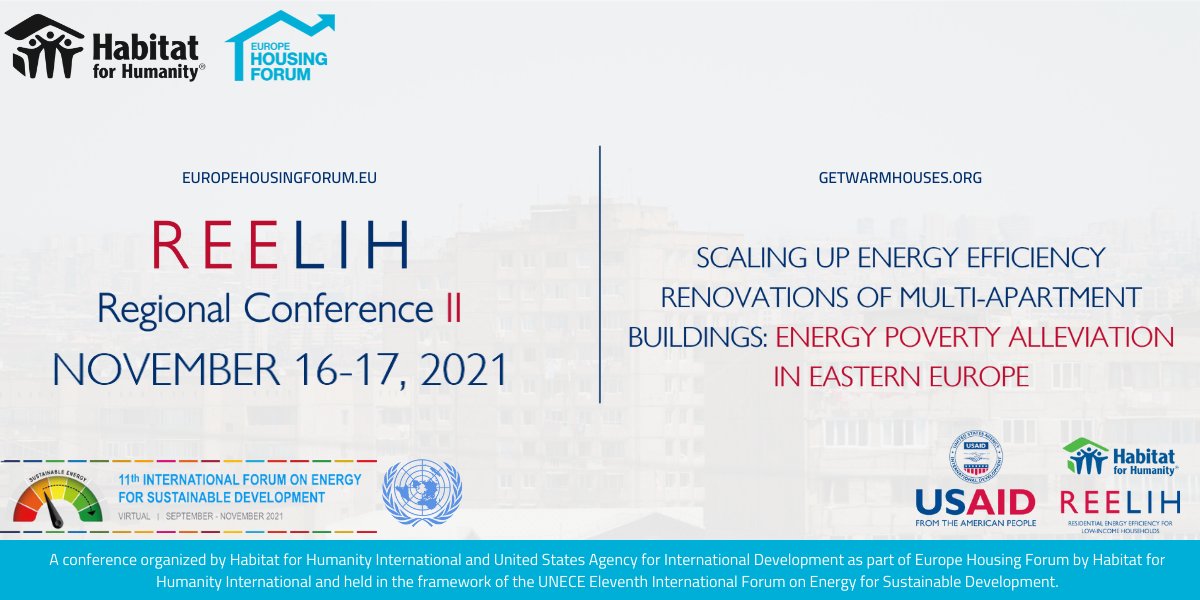Housing Europe’s Policy Director, Julien Dijol took part in the Europe Housing Forum side event REELIH Regional Conference II organised by Habitat for Humanity International on the 17th of November during the event on ‘Community mobilization: practices in the social housing sector’. His presentation focused on two aspects: a new way of tackling energy poverty that could be scaled up in the Eastern European regions as well as the relevant example of the Horizon 2020 POWERPOOR project which aims at raising awareness on what energy poverty means and what can be done to alleviate it.
Responsible for managing large amounts of the housing stock in many countries in a sustainable and inclusive way, social housing providers can be the first mover and a catalyst of a just energy transition. Public, cooperative and social housing providers in Europe who are necessary for the green transition and decarbonisation rely on systemic, district and the socially sustainable approaches to deliver climate-proof neighbourhoods. The systemic approach refers to the fact that energy efficiency is not sufficient on its own. Even though works to improve energy efficiency are done, it does not mean a decrease in energy consumption will immediately follow. There are different factors that influence this, one of those being the rebound effect, which simply put means the expected increase in efficiency that results following the implementation of a new technology decreases because of user behaviour. The residents need to understand how to make a better use of the buildings in which they live.
To combat this effect, social housing providers propose different solutions. One of these is the district approach itself. A concrete example is the real-life experiment done in Potsdam, Germany. Taking into consideration the impact on CO2 levels and the rent cost, the best option was considered to be combining optimal insulation with the greening of the district heating. Another example from Bordeaux, France, this time is using PV energy production to cover for needs of the social housing building, that was refurbished. In this case we are talking about the concept of renewable self-consumption. The idea of combining clean energy with renovation is essential at the moment in the social housing sector.
An example supporting the socially sustainable approach can be found in Sweden. Due to renovation, a deprived area was turned into one that people are proud to live in. It is not only about the impact on the environment, which is essential, but the transformation will be done with the residents, for the residents.
Julien also talked about OPENGELA, an EU project realised in the Basque country Housing Europe is part of, as it exemplifies just how social and public housing providers played a significant role in setting up district renovation in buildings where the majority of residents are homeowners. This was possible through the creation of a one-stop-shop, where all the parties discussed different renovation options and the means to finance them.
Housing Europe is leading several initiatives that contribute to decarbonisation and renovation of the building stock. One of them is the ambition to renovate 4,000,000 homes by 2030. More examples can be found on https://www.ourhomesourdeal.eu/ or https://www.housingevolutions.eu/.
Our Policy Director also gave an introduction to the Horizon 2020 POWERPOOR project – a great example of how to tackle the behavioural issue in the green transition. The project is about developing support programmes for energy poor citizens by encouraging the change of behaviour on one hand, but also finding alternative financing schemes using for instance energy cooperatives, crowdfunding or energy communities. POWERPOOR is centred around 3 tools:
- Power target: to identify whether tenants or residents suffer from energy poverty;
- Power act: personalised suggestions for changing the behaviour and participation in funding programmes;
- Power fund: a hub that’s supposed to bring together different finance instruments, to increase the knowledge but also to influence the policy making process.
All the information and examples presented above lead to the conclusion that the three approaches, systemic, district and socially sustainable, are needed to move forward with the decarbonisation process and the fair energy transition, as well as to increase the quality of life for everyone. The lessons from the non-profit housing associations in Western Europe are very important and could be replicated in other contexts including in southern and eastern Europe. Political support is necessary to set up legal entities, including homeowners associations that would be able to promote this principle.
Watch the full session here.
